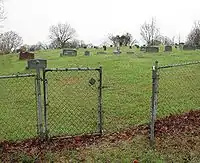Tocowa, Mississippi
Tocowa is a ghost town located just outside Batesville in Panola County, Mississippi, United States.[1]
Tocowa, Mississippi
Ptocowa Tocowa Springs | |
|---|---|
 Location of Panola County in Mississippi | |
 Location of Mississippi in the United States | |
| Coordinates: 34°13′25″N 90°03′35″W | |
| Country | United States |
| State | Mississippi |
| County | Panola |
| Founded | 1865 |
| Elevation | 236 ft (71.9 m) |
| Time zone | UTC-6 (CST) |
| • Summer (DST) | UTC-6 (CDT) |
History

In 1938, Federal Writers' Project wrote up a sketch of the town, and surmised its name to be derived Chickasaw and Choctaw languages meaning "healing waters".[2] However, more recent scholarship rejects the "healing waters" interpretation, and purports the name to mean "broken and bent down trees" or "firewood".[3]
During the late 18th century, and well into the 19th century, the town grew around a natural spring. The spring was used as a socializing area by Native Americans who believed in the spring's mysterious healing powers and that the water could heal braves wounded in battle.[2][4] In the May 25, 1867 edition of The Weekly Panola Star newspaper, the spring was described as "a fine, clear, and bold running mineral spring of known and well attested medicinal virtues".[5]
Notable natives
Former Mississippi governor Ronnie Musgrove was born and raised in Tocowa. At that time, the town had a population of 42.[1]
References
- "Mississippi Department of Archives and History" (PDF). Archived from the original (PDF) on 2010-10-16. Retrieved 2009-04-13.
- Works Progress Administration, Federal Writers' Project (May 1938). Gene Holcomb (ed.). Mississippi: A Guide to the Magnolia State. American Guide series. Viking Press. p. 382. ISBN 1-60354-023-7.
- Baca, Keith A. (2007). Native American Place Names in Mississippi. University Press of Mississippi. p. 117. ISBN 978-1-60473-483-6.
- National Park Service PDF file
- "The Coal Mines". The Weekly Panola Star. 25 May 1867.